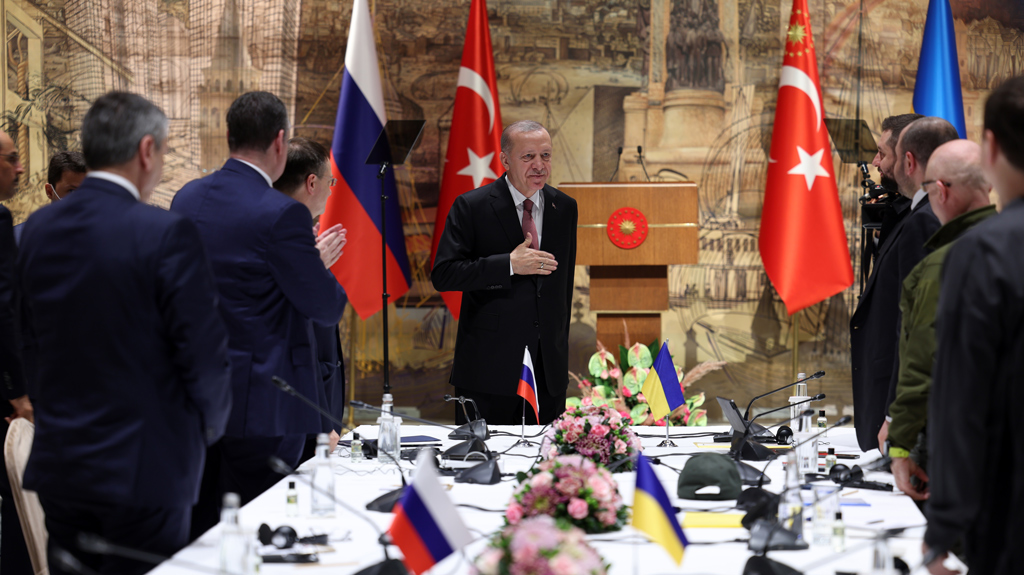
The West must support Turkiye's Ukraine diplomacy
Russian invasion of Ukraine has mobilized NATO and the Western alliance, and it is finally creating a new conversation about the future of regional security arrangements
Share
The Russian invasion of Ukraine has once again demonstrated Turkiye's crucial geopolitical significance. As a country dealing with regional security challenges and unprecedented humanitarian crises in the region, Turkiye has sought policy coordination and cooperation with Europe and the US for years, but to no avail. While Turkiye had to confront Russia and Iran on the ground in Syria to protect its national security interests, the West largely avoided "getting involved" in yet another Middle Eastern conflict. The US and European policies alienated Turkiye and were often in direct conflict with Turkish interests in Syria and beyond. In Ukraine, however, the West must do better.
Instead of attempting to help and coordinate policy with Turkiye, a NATO ally, the West primarily looked the other way when Russia and Iran gained ground in the Middle East. When Russia invaded Ukraine, the West finally decided to take Russia seriously and set out to impose heavy sanctions. The war raised awareness about Turkiye’s position and its unique role in handling the situation in the eyes of the West. However, Western support for Turkish diplomatic efforts has been rather faint as the assumption that Putin was not interested in arriving at a diplomatic solution has prevailed. This judgment may undoubtedly be correct, but strengthening Ukraine's hand in these talks should be a priority as much as supporting them on the battlefield.
Turkiye’s policy regarding the conflict
The current Western policy of supporting Ukraine is fully justified. Still, there needs to be a strategy to make diplomacy the only option for Putin, who probably thinks he needs to gain the upper hand on the battlefield. While NATO and Western allies are on the same page on their assessments and support for the Ukrainians' struggle against Russia, they must think together about devising a political solution instead of adopting the "bleed Russia" strategy without an endgame.
Turkiye's stance on the war in Ukraine has stressed the country's geopolitical, security, and economic interests since the beginning of the conflict. Turkiye's strategic vision and security concerns meant that it would stand with NATO partners in supporting Ukraine's territorial integrity and political independence while also providing military and humanitarian assistance to the country facing Russian invasion. Turkiye's economic interests required that it avoid imposing sanctions on Russia while pursuing a diplomatic solution as quickly as possible. As a country with a complex set of relations with both Ukraine and Russia, Turkiye sought to balance its national interests with its international treaty obligations.
A quick resolution of the conflict would be in Turkiye’s interest, which drives Turkish diplomatic efforts, but Putin's Russia appears in no hurry to strike a deal without gaining the upper hand militarily. Turkiye will likely push for talks to achieve immediate ceasefires and humanitarian corridors. However, the Russian goals are far from being performed, and there seems to be little room for Putin to be able to declare victory and accept a diplomatic solution at this point.
Turkiye already knows Russian tactics from Syria
The West is justified in its skepticism of Russian declarations about significantly reducing hostilities on the ground. This is an all-familiar tactic for Turkiye from Russian maneuvers since their intervention in Syria in 2015. Russia would bomb from the air and allow Iranian militias and the Syrian regime to clear and hold ground. The Ukrainian scene is dramatically different, but the Russian tactics of deploying their air force and military and diplomats to achieve their main goals are very similar. In this sense, Turkiye is fully aware that Russia might not be negotiating in good faith. At the same time, the alternative to diplomacy is a military victory that will not be achievable for either side anytime soon. A protracted conflict will increase costs, deepen humanitarian crises, and render impossible a political solution. However, these seemingly unbearable costs can be considered acceptable from the Russian perspective, exactly how they approached Syria.
In Ukraine, Putin might judge that he has already borne the highest costs, and there is no incentive to give up at this point. A clear victory is increasingly impossible to attain for Putin. Yet, he may be able to live with a prolonged conflict longer than many think. Despite their initial botched plans for a swift victory, Putin might still believe he could win in Ukraine and destabilizing Europe would be considered a success in his eyes. The West has long ignored Russia's increasing influence in the Middle East, North Africa, and the Caucasus. It might be underestimating the extent to which Putin is willing to go to declare victory in Ukraine. These dynamics and calculations are not good news, promising a prolonged conflict. This is, even more, the reason for the West to craft a robust diplomatic strategy akin to unity over solid support for Ukraine. In this vein, the West should support and capitalize on Turkiye’s existing track record on the diplomatic front.
The West should rethink the status quo
Until the Ukraine war, the West has underestimated Russian strategic and military moves throughout regions away from Europe. President Obama judged back in 2015 that Russia would find itself in a "quagmire" in Syria. When Turkiye tipped the balance in favor of the Libyan government against Haftar and the Russian Wagner group, it received much criticism from some Europeans. The United States Congress has condemned Turkiye’s assistance to Azerbaijan in ending the decades-long occupation of its territory and its efforts to counterbalance Russia in the South Caucasus. These are all examples of losing sight of the bigger picture about Turkiye as a NATO ally that continuously must deal with Russian power and influence throughout the Mediterranean, the Middle East, the South Caucasus, and the Black Sea.
The Russian invasion of Ukraine has mobilized NATO and the Western alliance, and it is finally creating a new conversation about the future of regional security arrangements. The invasion has pushed everyone to rethink the status quo, and whatever comes next will likely resemble a new Cold War where Putin's Russia will always be looked at suspiciously. This recent debate on security might be an opportunity for the West. Still, Turkiye needs to be taken seriously and treated like a valuable ally and a significant contributor to common security. To protect unity within NATO and avoid policy differences, the West must bolster its coordination with and support Turkiye’s diplomatic efforts. This would strengthen Ukraine's hand at the negotiation table and hopefully lead to conflict resolution in the end. The alternative, a protracted conflict with enormous humanitarian costs along the way, should be unacceptable.
[Daily Sabah, April 1, 2022]
Tags »
Related Articles







